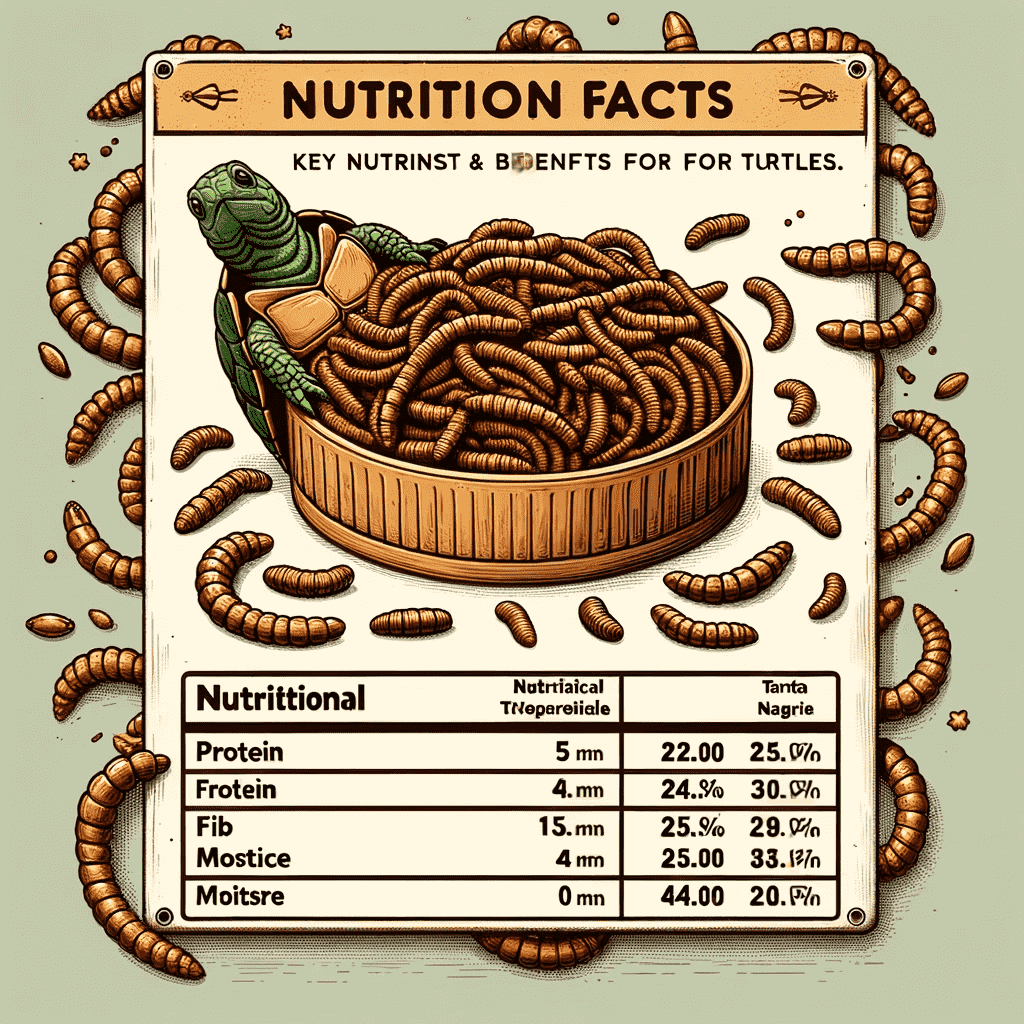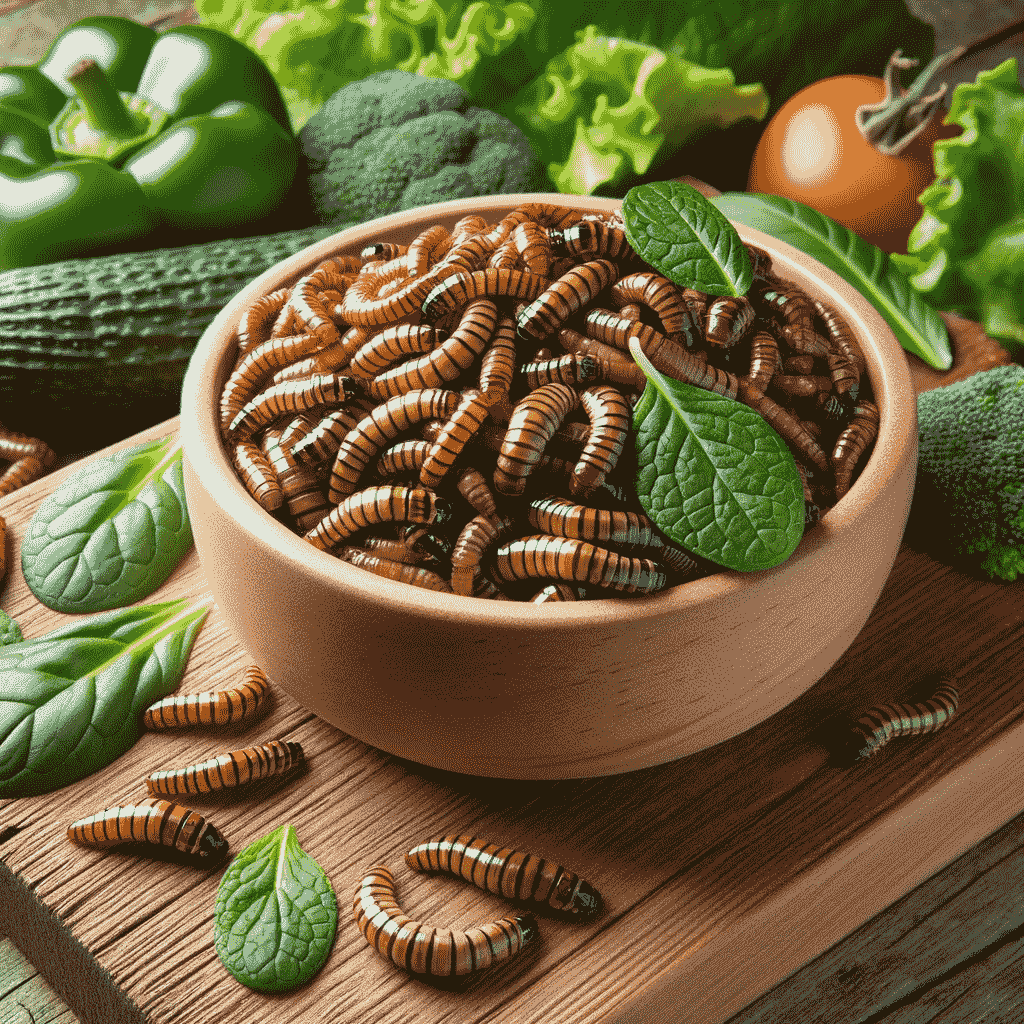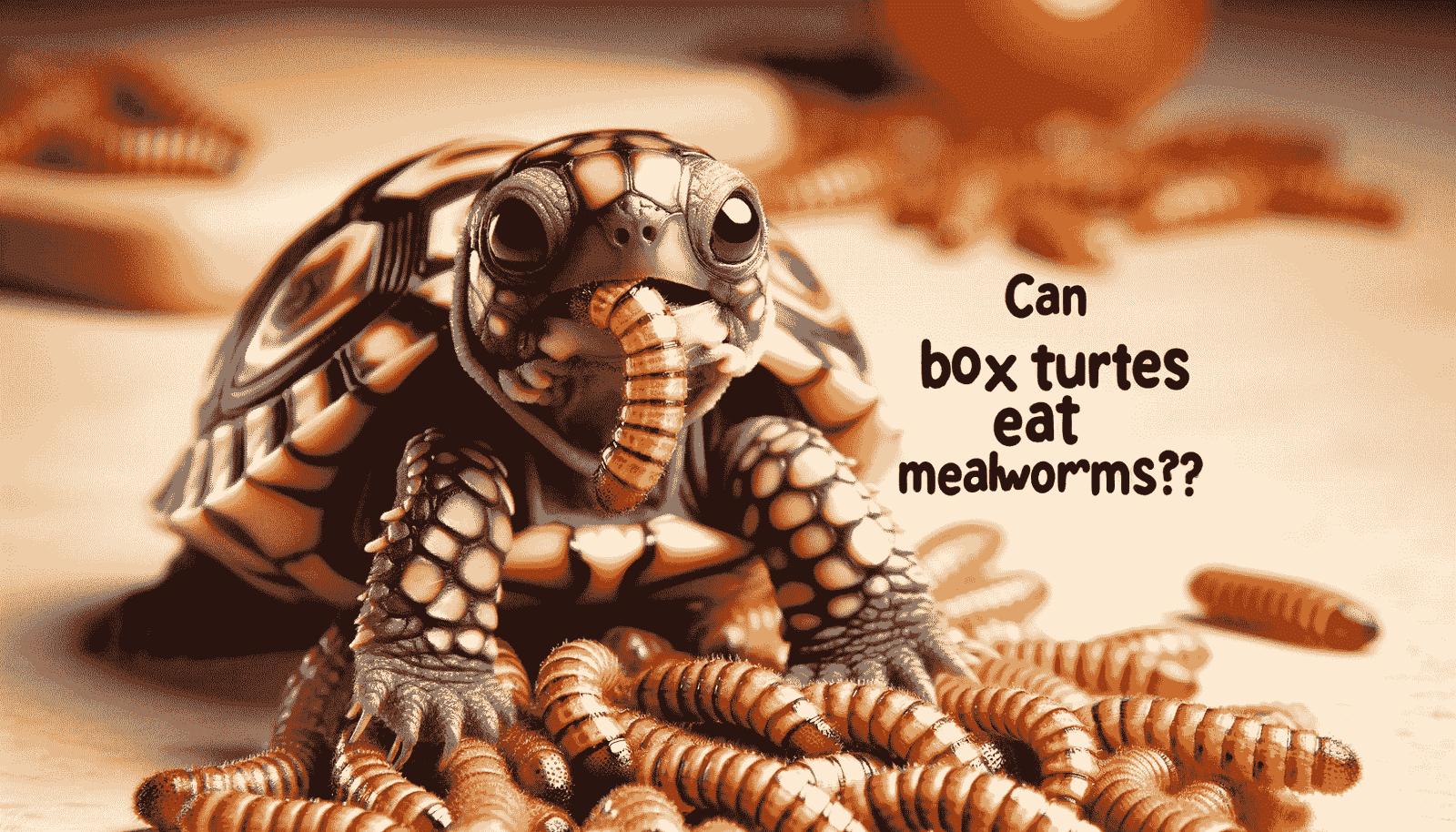For many box turtle owners, providing a nutritious and varied diet is a priority. Mealworms, often used as a protein source for reptiles, raise the question: Are they a suitable choice for box turtles? In this comprehensive guide, “Can Box Turtles Eat Mealworms?”, we delve into the benefits and potential concerns of incorporating mealworms into your box turtle’s diet. Understanding the nutritional value and the right way to offer these worms can play a significant role in maintaining the health and well-being of your shelled companion.

Can Box Turtles Eat Mealworms?
Mealworms can be a nutritious addition to a box turtle’s diet, particularly due to their high protein content. They are an excellent source of essential nutrients required for the healthy growth and development of turtles. Here are some key points to consider:
- High Protein Content: Mealworms are rich in protein, essential for muscle growth and overall health in box turtles.
- Fat Content: They also contain a considerable amount of fat, which should be factored into the turtle’s overall diet to avoid obesity.
- Other Nutrients: Mealworms provide other nutrients like calcium and vitamins, although the amounts vary.
Given their nutritional profile, mealworms can be beneficial for box turtles, especially when supplemented with other foods to ensure a balanced diet. However, due to their high fat content, they should be offered in moderation.
How to Feed Mealworms to Turtles?
Introducing mealworms into your box turtle’s diet should be done carefully:
- Quantity Control: Offer mealworms in small quantities as a part of the turtle’s varied diet, not as the main food source.
- Frequency: Feeding mealworms once or twice a week is generally sufficient.
- Serving Method: Mealworms can be served live, dried, or as part of a mixed meal with vegetables and fruits.
It’s important to ensure that mealworms are only a part of the turtle’s diet, complemented with a variety of other foods to provide all necessary nutrients.

Mealworms Nutrition Facts (Table and Explanation)
Mealworms are a rich source of nutrition for box turtles. Here’s an overview of their nutritional content:
| Nutrient | Benefit for Turtles |
|---|---|
| Protein | Essential for growth and repair |
| Fat | Provides energy, but should be limited |
| Fiber | Aids in digestion |
| Calcium | Important for shell and bone health |
While mealworms provide essential nutrients like protein and calcium, their high fat content means they should be fed in moderation as part of a varied diet.
Do Box Turtles Like Mealworms?
Box turtles generally show a keen interest in mealworms due to their movement and texture. They can be a stimulating and appealing food source for turtles, encouraging natural foraging behaviors. However, preferences can vary between individual turtles, and some may be more inclined towards plant-based foods. Introducing mealworms gradually and observing your turtle’s response is the best approach.
Health Risks For Box Turtles Eating Mealworms
While mealworms are nutritious, there are some potential health risks associated with feeding them to box turtles:
- High Fat Content: Overfeeding mealworms can lead to obesity due to their high-fat content.
- Nutritional Imbalance: Relying too heavily on mealworms can cause a nutritional imbalance, lacking in certain vitamins and minerals found in vegetables and fruits.
To mitigate these risks, mealworms should be offered as a part of a balanced diet, in moderation.
How Much Mealworms Should Box Turtles Eat?
The appropriate amount of mealworms for a box turtle depends on the turtle’s size, age, and overall health. As a general guideline, offering a small number of mealworms (about 5-10) once or twice a week is sufficient. This should be balanced with a diet rich in vegetables, fruits, and other protein sources.

How Do You Prepare a Mealworm-Based Recipe For Turtles?
A balanced mealworm recipe for box turtles might include:
- Base Ingredient: Start with a small serving of mealworms.
- Vegetables: Add a variety of chopped vegetables for essential vitamins and minerals.
- Leafy Greens: Include leafy greens like collard greens or kale for additional nutrition.
- Mixing: Combine all ingredients for a well-rounded meal.
This recipe ensures that your turtle receives the benefits of mealworms while maintaining a balanced diet.
Can Baby and Senior Box Turtles Eat Mealworms?
Mealworms are suitable for both baby and senior box turtles but in different portions. Baby turtles, needing more protein for growth, might benefit from slightly more mealworms in their diet. Senior turtles, however, should have mealworms in moderation due to their lower activity level and potential for weight gain.
Professional Advice
Veterinarians and reptile nutritionists recommend a varied diet for box turtles, including a balance of vegetables, fruits, and protein sources like mealworms. While mealworms can be beneficial, it’s important to feed them in moderation and as part of a diverse diet. Consult with a professional for personalized dietary advice, especially if your turtle has specific health needs.
Conclusion
Mealworms can be a healthy part of a box turtle’s diet, offering essential nutrients like protein and fat. However, they should be fed in moderation and as part of a varied diet to prevent nutritional imbalances and health issues. Introduce new foods gradually and monitor your turtle’s health. For the best dietary advice, consult a veterinarian or reptile nutrition expert. A diverse diet is key to the health and happiness of your box turtle.
Is It Safe to Feed Mealworms to Box Turtles?
Yes, mealworms are safe for box turtles when fed in moderation. They provide a good source of protein but should be part of a balanced diet.
How Often Can I Feed My Turtle Mealworms?
Mealworms should be fed as a treat, not as a staple diet. Offering them once or twice a week is sufficient.
Do Mealworms Need to Be Alive When Fed to Turtles?
Box turtles can eat both live and dried mealworms. Live mealworms can stimulate the turtle’s natural hunting instincts.
Can Mealworms Be the Only Source of Protein for My Turtle?
No, mealworms should not be the sole protein source. Turtles require a varied diet that includes different types of proteins, vegetables, and fruits.
Are There Any Turtles That Shouldn’t Eat Mealworms?
Turtles with specific health issues, such as obesity or dietary restrictions, might need to avoid mealworms. Consult a veterinarian for tailored advice.
How Do I Store Mealworms for Feeding?
Live mealworms can be stored in a refrigerator, which slows down their metabolism. Dried mealworms should be kept in a cool, dry place.
Can Baby Turtles Eat Mealworms?
Yes, but in very small quantities. Baby turtles require a protein-rich diet for growth, but it’s important to balance this with other nutrients.

